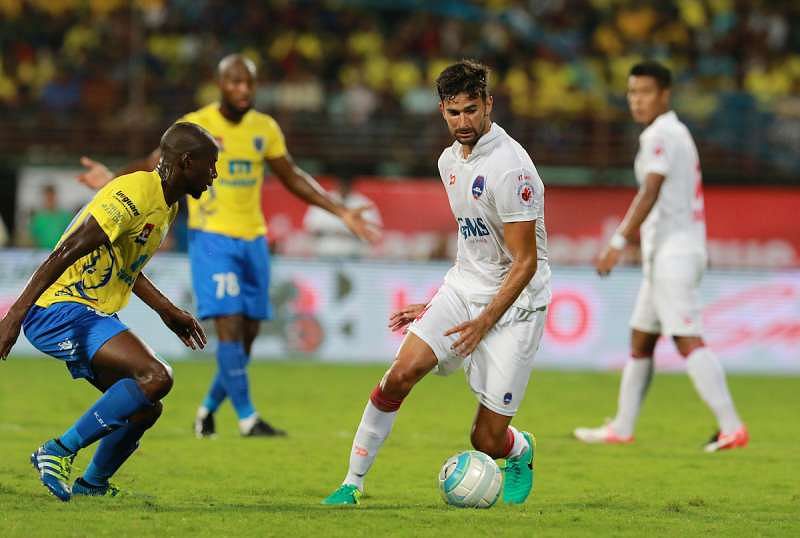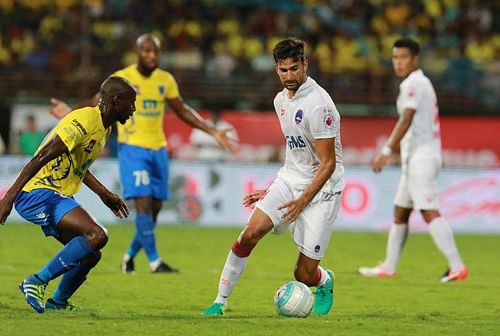
Everything at Real Madrid changed after Vicente del Bosque left: Delhi Dynamos midfielder Marcos Tebar
The underwhelming nature of life should never be taken lightly by any human being, irrespective of their talents, prowess or situation. Former Real Madrid player Marcos Tebar, who is currently playing for Delhi Dynamos in the Indian Super League, grew up in what can be called the cathedral of Spanish football – Madrid. A La Fabrica graduate and a part of the famous Cantera, Tebar could not excel in the first team despite making nearly a 100 appearances for Real Madrid B.
Following his departure from Real Madrid, Tebar played for Girona, Almeria and Brentford, before signing up Llagostera. A defensive midfielder, Tebar has the experience of playing in both Madrid and Catalonia, something that is a rare achievement, given the relationship between the two regions. The 30-year-old spoke to Sportskeeda in an exclusive interview, opening up about a lot of things including his career, time at Real Madrid, the footballers he grew up idolising and a lot more. Here are the excerpts:
How has the ISL experience been for you till now? Are you enjoying?
The experience has been really good till now. Our first couple of games in the ISL have been away from home, which can never be easy, but I think we have managed to do well in both of those. I am looking forward to playing in front of our home crowd in New Delhi.
Having played so many away games in La Liga, what is the biggest difference you spotted between India and Spain in this particular context?
Well, the game against Kerala Blasters was quite amazing, to be honest. The supporters were full of energy and the atmosphere was electric, which made it an excellent ground to play football. The big difference between the away games is that in Spain, it is really hard to win away games. In fact, the way we managed to control the game in Chennai, I do not think it would be easy to achieve the same there.
The weather in Spain, like India, can get a bit warm during the season. Have you had any troubles adjusting to the weather here?
I think the temperature is similar but the big difference is in the humidity levels, which are significantly higher in India. So when you are playing in India, maintaining similar energy levels throughout the game becomes really tough. The second half, especially, is particularly tough and it is difficult to maintain a pace similar to the first half due to the loss of energy. The trainer tells us to keep hydrated during the game and we start drinking a lot of fluids one day before, in order to cope with a loss of water when the match is going on.
You were born in Madrid and then went on to join Real Madrid’s youth academy. Tell us about your time there and how it felt to be playing in the youth academy of the world’s biggest club?
I was 12 years old when Real Madrid signed me from another academy and it was a dream come true for me since I had always been a Los Blancos supporter. Things started falling into place for me and, step-by-step, I made progress at the club and when I managed to play alongside the likes of Zinedine Zidane and Luis Figo, it was a huge thing for me. When you grow up idolising certain players, watching them play on television and then finally you get a chance to share a dressing room with them, it is like a dream.
Real Madrid, your former club, always had a strong academy culture but in the recent past, around a decade, we do not see a lot of players from the youth system graduating to the first team. Any particular reason why you think this has changed?
I think things changed drastically when manager Vicente del Bosque left the club and it had a huge impact. He was a different manager and knew every single player from the academy. Due to this, if an academy player was good enough to graduate to the first team, even if it was a teenager, del Bosque would ensure that he featured in the line-up. When he left Real Madrid, everything changed and Florentino (Perez) started to sign a lot of foreign players, thereby not trusting the talent at the academy.
However, this turned out to be good for other teams in La Liga and clubs outside Spain as they were aware of the talent produced by La Fabrica. From a player’s perspective, if he gets the chance to play for Real Madrid first team then it is great. Otherwise, he has to look out for options outside Madrid because playing time is of supreme importance. If they manage to perform well at other clubs, they can always be bought back. There is a big wall between the Real Madrid B team and the first team because the best players in the world play for Los Merengues.
Despite making 94 appearances for Real Madrid B, things did not work out for you in the first team. Any particular reason why that happened?
Like I told you, there is a big difference between the B team and first team. I was playing in the second division but then I got injured and as a result, I had to stay at Real Madrid for recovery. When I returned from my injury and recovered completely, I could not get many chances to play and as a result, I had to move to Girona. It happened to me and a lot of players.
You are a Madrid-born player who played for Real Madrid and then went on to sign for Girona, which is a Catalan team. Even right now, you are with Llagostera, another club in Catalonia. The divide between Catalans and other parts of Spain is well known. Did this particular dynamic not affect your mind when you chose to sign for a club from Catalonia?
At first, I had the same mindset and thoughts like you are saying right now because when I was in Madrid, I had literally no experience of how life would be in Catalonia, both personally and professionally. However, when I went there, it did not turn out to be problematic at all. At first, some people thought that ‘this is a player from Real Madrid and we are from Catalonia’ but after a couple of games, when they saw me play, they realised I was a good player and meant well.
So, you mean to say that players from Catalonia and even the fans, in general, do not have a dislike towards Madrid? Because reports and incidents suggest that there is quite a rift between these two sections, especially from a players’ perspective. Also, publications like Marca and Mundo Deportivo, due to their obvious dispositions, are loggerheads at each other.
I think all these things have to do more with politics than anything else because in Spain when you are a football player, you do not have that type of problem at all. Obviously, like you said, publications in both regions are constantly trying to have a go at each other. But this is because of internal politics and rivalries. I, personally, did not feel anything like that. Even when i was playing in my junior days alongside Cesc Fabregas (another Catalan), we did not have any such inhibitions. We were young players trying to enjoy the game.
When you were growing up as a youngster, which footballer did you idolise?
I wanted to be like Pep Guardiola, who was a top class central midfielder for Barcelona. From Real Madrid, I really liked Redondo, another top class defensive midfielder. At present, I think Sergio Busquets is the best player in his position.
What is the biggest difference between the level of football in Spain and India according to you?
I think the biggest difference is the pace of the games because the intensity in Spain is quite high. But I also think that humidity plays a huge role. There are a lot of tactical differences as well. For example, you will find huge spaces on the field in India, something I noticed during the game, whereas it is hard to find that kind of space in Spain.
You talk about the tactical differences. Are players at academies in Spain and Europe trained tactically on a drawing board for the development of footballing acumen?
Absolutely, I think teaching tactics is critical for a player’s progress and career. Another big difference I think between players in India and other countries, especially from Europe, is of the managers because I remember when I was at the Real Madrid academy, I had great coaches and they helped me developed my footballing sense. So I think if players in India get exposed to good coaching from an early age, it would be hugely beneficial.
Is there a huge difference between how Gianluca Zambrotta manages a side as opposed to Spanish coaches you have played under, considering the fact that he is Italian?
No, I think Gianluca Zambrotta is a bit different as compared to the regular Italian managers because he has played outside his home country. He has played for Barcelona and that experience helps tremendously. Also, I think football is changing tremendously and teams in Italy are not what they used to be.
More Indian Football news, transfer rumours, analysis and features at Sportskeeda.com
